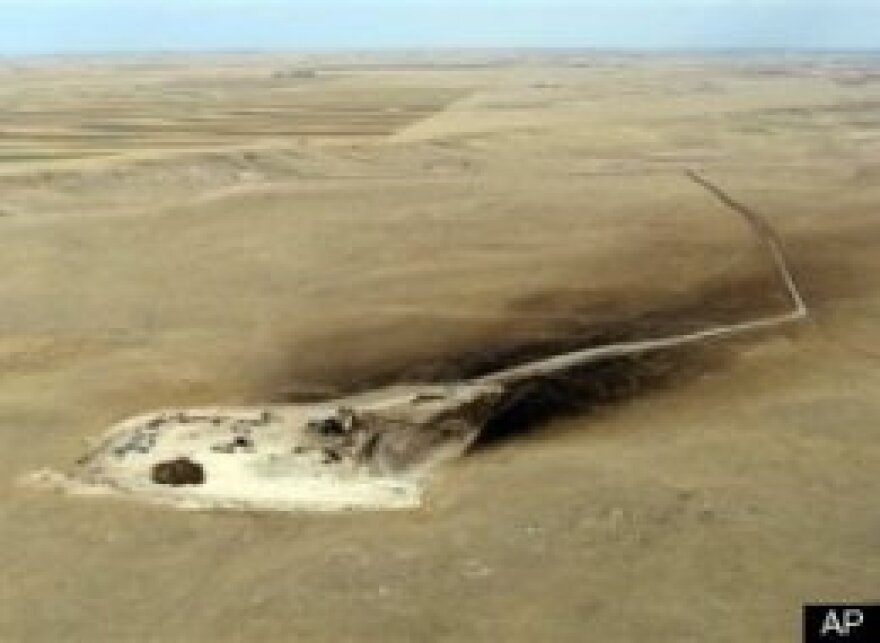Wyoming regulators recorded hundreds of spills by the oil and gas industry last year, but issued just a handful of fines. As Wyoming Public Radio’s Stephanie Joyce reports, that’s actually not unusual.
STEPHANIE JOYCE: ‘Genie McMullan knows when there’s been an oil spill from the production wells on her goat farm in the Big Horn Basin.
'GENIE McMULLAN: When there’s a spill there’s a sharp smell, it’s a burning smell to my senses, my nose, my eyes, my lungs.
JOYCE: McMullan and her husband bought the property a decade ago with full knowledge that there were wells on it. She says they figured the wells would be little trouble, but that turned out not to be the case.
McMULLAN: Within the first week, we walked the property and down on the bottom, we found one flow line leak… well tie-in… in between the two wells themselves, flowing all over the pastures.
JOYCE: Since then, McMullan says there’s been at least one spill every year, including one in 2010 that went on for two weeks before anyone responded. She says they report the spills to all of the regulatory agencies, but that they keep happening.
McMULLAN: After so many spills they started coming out… We had seven, eight people standing around, discussing different options, but to no avail. It’s still going on.
JOYCE: And she says the agencies didn’t actually follow up to make sure the required clean-up happened.
McMULLAN: You take some of the dirt down there, wad it up in a ball, and it stays in a ball because it's so full of oil. And this isn’t just one or two little patches…it’s large areas. Try and grow anything on that? Having goats, we’d welcome weeds, but a lot of that doesn’t even grow weeds down there.
JOYCE: McMullan doesn’t have much hope that the spills will stop without some regulatory prodding. She’d like to see big fines, with that money put towards reclamation.
But in 2013, the Wyoming Department of Environmental Quality issued only a handful of fines -- mostly for intentional dumping -- and the Wyoming Oil and Gas Conservation Commission issued no fines.
Commission natural resources program supervisor Tom Kropatsch says it doesn’t make sense to fine companies for spills that happen because a pipe freezes or a valve malfunctions.
TOM KROPATSCH: In some of these unintentional spills, I’m not sure that a fine would really be a deterrent to something that an operator wasn’t trying to cause in the first place.
JOYCE: In light of that, Kropatsch says the Commission is focused on making sure an operator reports the spill and does appropriate clean-up. He says when spills aren’t cleaned up, then the Commission levies fines.
KROPATSCH: The last fine that the Commission had ordered was in 2011, and that was for spills and a couple other issues that the company had with compliance with the rules, but mainly because there was no response on cleanup of the site.
JOYCE: The Department of Environmental Quality takes a similar approach. Joe Hunter is the emergency response coordinator. He says a lot of spills happen in winter, when there’s freezing and thawing of equipment.
JOE HUNTER: Companies have really taken it upon themselves to try to upgrade their equipment. I think they’re doing a pretty good job of policing themselves, unfortunately these things are going to happen. It’s the nature of the beast.
JOYCE: Hunter says spills are on the rise in Wyoming with increasing oil and gas production. But because of recent changes in record-keeping, it’s hard to say for sure.
So I asked if they use the data they collect to analyze how the spills are happening, and how to prevent them in the future.
HUNTER:You know, we have, we’ve suggested using heat traces on valves and things that regularly freeze and break.
JOYCE: So you’ve made those suggestions, but they’re not enforceable?
HUNTER: No, I don’t believe we have any regulations to enforce that type of thing.
JOYCE: So where does that that leave landowners like the McMullans? ‘Genie says she only sees one way that the spills are going to stop:
McMULLAN: We hope and we pray that they just go dry, go away, make them just go away.
JOYCE: The wells on the McMullans’ land are old, and the day when that happens may actually be fairly close. But others may not be so lucky.









